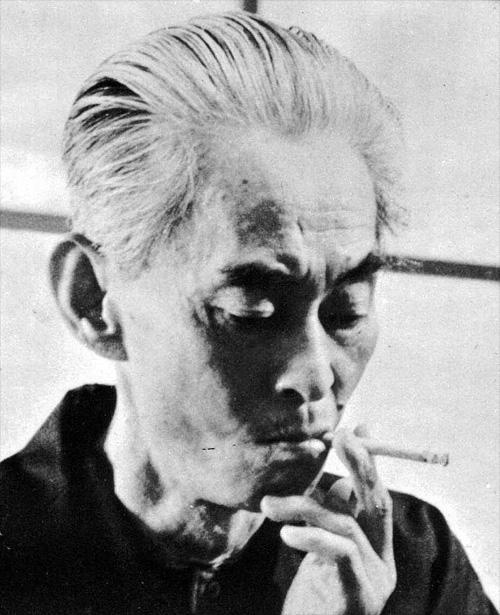I can't find the rebuttal to which it is a rebuttal, but I found this blog post curiously compelling.
I say 'curiously' perhaps because I find both sides compelling. If the question is something like 'to be or not to be', then it is that question that is involving here, and I don't feel at the moment the need to add anything to what I have already said regarding the question elsewhere and at other times.
Momus, no longer blogging, is, nonetheless, still with us. Here's a new song:
I know that some deny there's such a thing as a zeitgeist, but I can't help thinking that the statement 'death ruins everything' touches on a mood that is… prevalent.
In my bedroom.
And possibly other parts of the world.
There's a man in that video who reminds me somewhat of Kawabata Yasunari. There is a photograph of Kawabata that I very much like, but I can't find it on the Internet. This one will have to do:

In the photograph of which I am thinking, Kawabata is kneeling on the floor in a dark-coloured kimono. He is thin, and his hair is spiky. He looks like a skeleton with bright, deep eyes. I seem to remember – perhaps someone will correct me – that after he was orphaned, Kawabata was brought up by his blind grandfather. Because his grandfather was blind, Kawabata became accustomed to staring at his face, simply staring, and not averting his eyes, and this formed a habit of staring at faces that people were to find disconcerting when Kawabata grew older.
Before his suicide – again, if I remember correctly – Kawabata claimed that he had been visited by Mishima's ghost.
Someone, I believe, referred to Kawabata as 'the eternal traveller'. Was it Mishima? Perhaps. Perhaps not.
I am reminded of the beginning of Matsuo Basho's Oku no Hosomichi (The Narrow Road to the Interior):
The days and months are eternal wayfarers, and the passing years are travellers, too. Those who float their lifetime on the planks of a boat, or go forward to greet old age leading a horse by the bit, making their days a journey, make of the journey their home. Many are the great ones of old who have died on the road. I, also, from before I can remember, have been lured by the winds that scatter clouds, unable to suppress the yen for wandering…

There is a tone of universality to this passage, as if it is not written by an individual at all. Discussing it with someone whose mother tongue was Japanese, I was told that you can tell from this opening that the author is a very depressed person. At first I thought I was puzzled by this statement, but then it seemed to me that I knew exactly what it meant.
I retrieved some belongings from Wales recently, among them a bilingual copy of Kawabata Yasunari's speech made on the occasion of his winning the Nobel Prize for his novel Snow Country. From Edward Seidensticker's translation:
The Zen disciple sits for long hours silent and motionless, with his eyes closed. Presently he enters a state of impassivity, free from all ideas and all thoughts. He departs from the self and enters the realm of nothingness. This is not the nothingness or emptiness of the West. It is rather the reverse, a universe of the spirit in which everything communicates freely with everything, transcending bounds, limitless.
The same message is restated at the end of the speech:
My own works have been described as works of emptiness, but it is not to be taken for the nihilism of the West
I notice that more Momus songs are now up on YouTube. This is one of my favourite Momus songs (I believe it was an 'extra track' on Circus Maximus):
If you enjoy the song, maybe you'll see your way to buying an album or two.
Sorry I have been slow to answer comments recently. I'll catch up.

Anonymous writes:I’m confused,the man making the rebuttal has children? I mean if he wants to build support for his beliefs that may be a fact that he may want to leave out.
I believe his beliefs changed after he had children. An interesting position to be in. Also interesting is the fact that the person arguing against anti-natalism has no children.